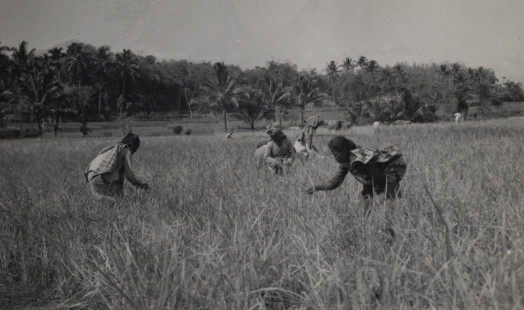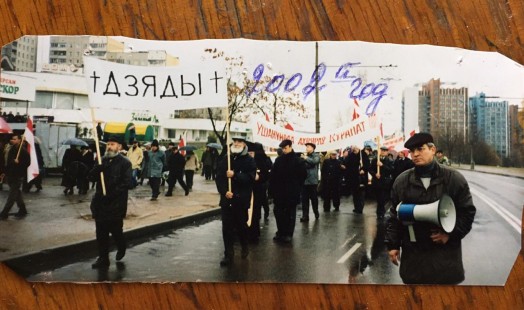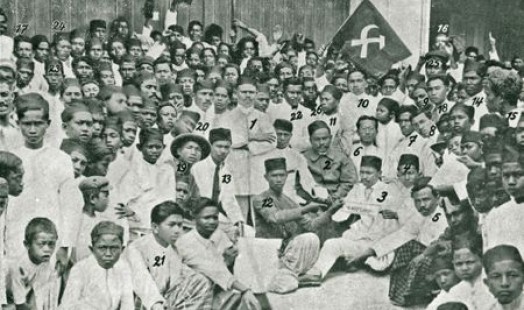

'Modern slavery': why is unfree labour so persitent? by Jan Lucassen
Ever since 2020, human rights organisations have been raising alarm about the abominable labour conditions and disenfranchisement of migrant workers involved in the construction of stadiums and other infrastructural works in Qatar in connection with the World Cup starting on 20 November of this year.
The IISH and the Pandemic by Aad Blok
The Covid pandemic and its consequences for public and private life have been talked and written about endlessly in the past year, from a great many different perspectives and views.
‘Dachushka, do you live in freedom?’ Three generations of Belarusian protest by Eline Helmer
When I walk in, Natalia is sitting at the kitchen table in her daughter’s flat in Rotterdam, frantically writing. While Polina brings me tea and biscuits, her mother practices a poem she wrote in honour of the ‘Night of the Executed Poets’.
The PKI archives and the need for more inclusive descriptions by Rika Theo
But it seems you do not realize, Meneer Pangemanann, that your report is not for the general public. Only a very few people in the Indies and in the world have read and studied it … You will never know, and indeed do not need to know, who else has read it.
Pramoedya Ananta Toer, House of Glass (New York, 1992), p. 24.
Black Lives Matter in global history by Leo Lucassen
The Black Lives Matter protests in the United States resonate strongly throughout the world. Not only in Europe, but also in Seoul, Monrovia, Sydney, Rio de Janeiro, and even in war-torn Idlib in Syria, where a mural honouring George Floyd has been painted. But the protests have also generated opposition. Critics of the protests often point at other forms of racism, for example in Asia and Africa, asking ‘what about racism in other parts of the world?’ Although in itself a legitimate question, it is used as a rhetorical strategy to trivialize widespread institutional racism against people of colour, especially pertaining to descendants of enslaved Africans in the Atlantic world.
Spanish flu: How the world changed in the aftermath of the 1918-1919 pandemic by Touraj Atabaki
“One fateful night in the summer of 1918, with the Great War about to end, in the heart of the darkness three menacing horsemen each in possession of a whip and sword silently breached the walls and entered the town. One was called Famine, another Spanish Influenza and the other Cholera. The poor, the old and the young fell like autumn leaves ravaged by the assaults of these ruthless horsemen.”
'Pandemic puts labour relations in the limelight', by Gijs Kessler
The COVID-19 crisis mercilessly exposes the fault line between the employed and the self-employed in today’s Dutch society. The closure of bars, restaurants, and clubs, the restrictions on the work of hair and beauty professionals, and the cancellation of mass events have a direct impact on the livelihood of entrepreneurs and the self-employed, while, for the time being, most salaried workers continue to receive their wages regardless of whether they can continue carrying out their tasks or not.
Comparing Covid-19 and the Spanish Flu: Not so much the ‘Great Leveler’ but particularly hitting the poor, by Ulbe Bosma
“The Coronavirus pandemic will cause famine of biblical proportions”, the UN warned on Tuesday 21 April. It immediately made a headline in The Guardian and other media followed suit. The COVID-19 epidemic not only has grave consequences for societies with fragile health care systems, for many countries it comes after locust swarms have battered their crops.






![Illustratie: Groep arbeiders op collectief stukloon in de baksteenindustrie, Noord-Duitsland, 1903. [Bron: Landesarchiv NRW Abt. OWL, Detmold (Germany), D 75 Nr. 2670.]](/files/styles/12x7_524w/public/2020-05/KesslerLucassen_Ill8.2.jpg?itok=r1Il4wBs)



